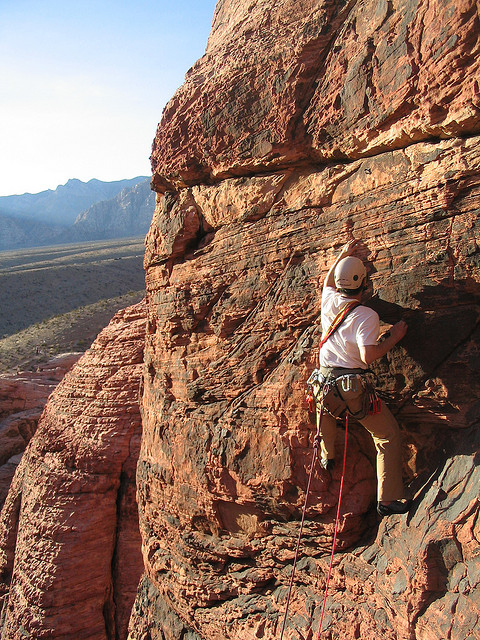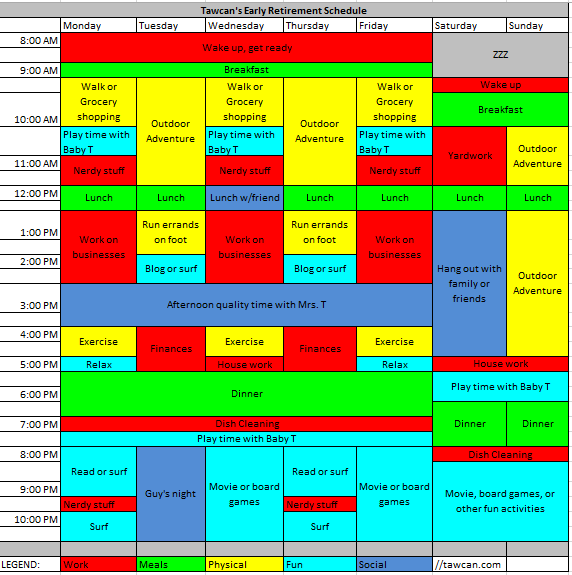When I think about retirement, I have never pictured myself sitting on the beach drinking pina coladas daily. That’s not how I picture retirement. I could sit on the beach for a few days but for weeks on end? I would get bored out of my mind. I will want to do something more fulfilling than spending my days idling around.
For me, retirement is not about sitting around and not doing anything. And early retirement is certainly not about having the lowest expenses possible by eating beans and ramen noodles every day only to deprive yourself and not enjoy life.
Retirement is about having free time to do activities that I enjoy, regardless of whether I am making money or not. It’s about spending time to improve my community, helping others around me, and improving myself as an individual.
This sentiment is very well-versed and summarized in a quote I heard at my high school music teacher’s retirement party:
At the end of the day, it’s not about how much money you make, it’s not about how big your house is, it’s not about what kind of car you drive, it’s about the relationships that you build and the impacts you’ve made on other people’s lives.
Given our dream is to become financially independent and live off dividends by 2025, I have been spending a bit more time thinking about early retirement and what I am retiring to.
Don’t get me wrong, I still enjoy my job and find it challenging and all, but it doesn’t prevent me from thinking and planning about retirement. Furthermore, after working in high tech for almost 17 years, I have learned not to take things for granted. The next round of layoffs could be just around the corner… (we’ve seen many layoff announcements from the likes of Meta, Amazon, Twitter, Intel and Google in recent months).
When I was in my 20s, I used to be quite adventurous and spent a lot of time in the great outdoors. I’d be what you called a weekend warrior, spending weekends hiking, climbing, skiing, and exploring the great outdoors. Unfortunately, I started putting my outdoor adventure days behind me after having kids.



I still head out to and do outdoor adventures occasionally, albeit a much tamer version than what I used to do in my younger days…
For spring break this year, we spent a week at Whistler skiing. I really missed skiing as well as the amazing views of the snowy mountains and landscapes.
“I know what I want to do when I retire… ski and enjoy the snowy view regularly each week in the winter,” I told Mrs. T as we were riding the Whistler ski lift one day during the vacation.
Mrs. T then kindly reminded me that I need to take care of my body so I can continue to do these outdoor adventures as I get older (she can be very practical this way ha!).
So how do I imagine my retirement life? Back in 2015, I wrote about fighting for financial freedom and imagined what my early retiree’s schedule would look like.

A lot, not surprisingly, has changed since 2015. Now with two elementary school-aged kids and being in my early 40s, my early retirement schedule would certainly look very different.
Looking at this schedule, my immediate thought is that I want to have a more flexible schedule. I don’t want to restrict myself to only doing certain activities on a certain day or at a certain time.
Essentially, I want to avoid rigidity in early retirement and strive for flexibility instead. I would like to have the flexibility to do different activities as I want and not have the activities dictated by my daily schedule (I realized some activities like fitness classes or picking up kids have a more rigid schedule but let’s ignore those for now).
On a high level, here are some activities I’d want to do in early retirement:
- Go skiing regularly in winter, preferably during weekdays to avoid crowds
- Go hiking regularly, preferably during weekdays to avoid crowds
- Workout three to four times a week
- Go swimming two to three times a week
- Work on this blog
- Spend more time on hobbies, like photography
- Take my kids to school and pick them up
- Cook dinners with Mrs. T
- Go for walks with Mrs. T when the kids are at school
- Volunteer as a Scouter in multiple groups
- Volunteer at local charities
In short, my goal is to keep myself engaged in various activities and keep myself mentally and physically challenged on a daily basis. My purpose in early retirement is to improve myself, build and strengthen relationships, and create positive impacts in my community.
Unfortunately, too many people tie themselves to their work and define themselves by their jobs. When they do retire, all of a sudden they find that they have lost the identity they’ve known for decades.
This loss of identity can be detrimental in some cases. Recently, Mark McGrath, CFP posted a series of heartfelt tweets on the importance of making sure you know what you’re retiring to.
Make sure you know what you’re retiring to.
This was a hard post to write.
I almost didn’t write it in fact. I’ve started and trashed this story many times.
But I believe there are important lessons in this story we can learn from.
Warning: this does not have a happy ending.
This is a story about my dad.
My dad grew up the youngest of four siblings in Quebec.
He, his siblings, and my grandparents moved to Vancouver in the 70s, and my uncle opened a tile store.
My dad worked for him for a while, then eventually opened his own store.
He was a relentless entrepreneur and a good father.
He was shrewd and pennywise. I used to joke that he would split 2-ply toilet paper to save money.
But he was also a savvy investor, and he did well in his business.
He didn’t care about tile and saw the business as a means to an end – a way to build wealth and retire.
He was laser-focused on this goal.
He was fit, active, and a traveller.
He was a scratch golfer and swam 80 laps at the pool three times a week.
He was also a black belt in karate and extremely disciplined.
Like many French Canadians, he loved steak and beer.
But any time he found himself getting “soft”, he would just switch that off – he would diet and quit drinking for a month or so until he got his six-pack abs back.
I didn’t realize as a kid how impressive that was.
He used to read books on longevity and admired the lifestyle of the people of Okinawa.
Okinawa has some of the highest life expectancies on Earth, and is home to one of the greatest concentrations of centenarians.
He planned to live a long, long time.
My brother and I had a great childhood.
We played sports, went camping, and took family vacations.
I played high-level baseball and my brother played high-level hockey, and our parents never missed a single game.
We lived in a nice house and had everything we needed.
My dad was private, and we never really knew his financial situation.
Growing up, we would ask him if we were rich, to which he always said, “no, but we have enough”.
Eventually, my parents split up.
But they remained close and lived in the same neighbourhood.
One day he told us he had sold his business and was retiring.
We were thrilled.
All he wanted to do was retire so he could keep travelling, golfing, swimming, and enjoying his life.
He booked a two-month trip to Asia to celebrate.
He was 58.
And then it all went downhill.
Within a month of returning from his trip, he was back working for the guys he sold his store to.
He didn’t need the money – he just missed his store and his friends.
His best friend was his first employee – a man he had hired 30 years earlier.
This worked out for a while.
But slowly, he started to change.
After a few months of golfing near-daily, he got bored.
And then he got depressed.
He changed.
One day he said he didn’t like steak anymore.
This man had eaten steak three times a week for over 40 years.
Something was up.
He called me one day from the UBC Psychiatric Ward.
He told me he was having dark, intrusive thoughts and thought he should get checked in.
I didn’t realize how serious this was, but I noted that he had the wherewithal to realize it and seek help immediately.
I went to see him, and he had made friends with half the patients in the ward. Including a well-known ex-Vancouver Canuck hockey player. He told me that night he had made a mistake by going there. That this place was full of crazy people, and he wasn’t crazy (his words).
They gave him antidepressants, and he checked himself out.
He seemed better until a few days later.
We were scheduled for dinner at my mom’s house, but he didn’t show.
This was not like him.
After about 30 minutes, my mom panicked and said: “something is wrong.”
We called the police, and they came by about an hour later.
In mid-sentence, the officer got a report about a car accident in his earpiece.
The vehicle involved fit the description of my mom’s car, which he had borrowed.
He looked at us and said, “your dad is alive, but…”
We rushed to the hospital.
All we knew was that he was alive. We had no idea what the extent of his injuries were.
When we got there, there wasn’t a scratch on him.
The paramedics told us they needed “the jaws of life” to pry him from the wreckage.
It was a miracle.
But something was nagging at me.
My dad was an exceptional driver.
And the crash location was a j-curve intersection he drove through twice daily on his commute for over 20 years.
I called his best friend to get his take.
His best friend told me that my dad had called him right before the accident.
He told him he had stashed his wallet and ID under a garbage can in a parkade on the other side of town.
A parkade he had no business being at.
To this day I still don’t know why he did that.
My only guess is that he crashed that car intentionally.
He went 100km/h through a red light straight into the j-curve.
He rolled it three times.
I think he didn’t want his ID on him because he didn’t want to be identified immediately.
But he was wearing his seatbelt…
Over the next few weeks, he was overcome with the fear that he would be arrested and put in jail because of the accident.
We tried to explain that no crime was committed, and that no one was hurt.
But he was adamant.
This fear paralyzed him.
Then one day, I was on the Skytrain on my way home from work.
My dad called and said he had a fight with my mom and he was going to grab a hotel.
I told him to come and stay at my place for the night, but he didn’t want to bother me.
That was the last time I spoke with him.
That night, on a foggy Thursday in October, I was awoken by a phone call from a private number. I ignored it. And they called back. It was the police, and they told me my mom was upset and that I needed to drive the 40 minutes in the middle of the night to see her.
I told them if I was driving across town in the middle of the night, I wanted to know why.
He was hesitant, but I was persistent.
Then he told me, “your father is dead.”
I collapsed and remembered only that I kept saying, “I had so much more to tell him”.
He had rented a car for some reason, drove it to the middle of the Lion’s Gate Bridge in Vancouver, turned on the hazard lights, and got out.
Then he jumped.
Two cyclists – one on the bridge, and one down below on the seawall – called it in.
Why am I telling you all this?
Selfishly, because it’s been almost a decade, and I’m not sure I’ve really had an outlet until now.
But also because I think I know what happened, and I think people can learn from it.
+What I think happened is that my dad’s business became his identity.
He was the tile guy.
He was the guy that sponsored all of our sports teams.
In a booming town, he was the guy you went to when you needed tile.
He was the tile guy.
And when he sold his business, he stripped himself of his identity.
Now he was a nobody.
He lost his purpose, the very thing that made him who he was.
Whether he knew it or not, I think he loved the business because it gave him a sense of fulfilment he didn’t know he’d miss.
By losing his purpose, he lost his essence, his spirit.
The thing that gave him his joie de vivre.
He had surmounted his biggest challenge and achieved his singular goal.
And there was nothing on the other side.
And remember, this was a guy who had lots of friends, social activities, sports, and hobbies.
And still, retirement undid him in less than 18 months.
Humans require a purpose.
And if that purpose is linked to your business, be careful leaving it behind.
As a financial planner, I didn’t get any training in this. We learn about the financial side of retirement but not enough about its emotional and psychological aspects. About how our identities can be intertwined with our careers and our businesses.
So when you think about retirement, think about what you’re retiring to.
Focus on your relationships, mental health, community, and purpose.
And spend time before you retire on finding a path to fulfillment.
I feel terrible to hear this personal story. The idea of focusing on your relationships, mental health, community, and purpose in retirement really aligned with my ideas.
Therefore, it is critical to make sure you know what you’re retiring INTO. We all need a purpose in life and that purpose shouldn’t be tied to your job, work, or business. We can do a lot of financial planning by running different calculations and simulations but I believe it is even more important to prepare ourselves emotionally and psychologically.
Regardless of whether you are close to your retirement or not, it is vital to know yourself and understand what you want to do when you’re retired. Spend some time thinking about your plans in retirement, it will be better than not having any plans and just winging it.
Dear readers, do you know what you’re retiring to?


Great post. I loved seeing your 2015 retirement schedule. We had something similar. It is interesting to see how we change as we get older. I thought I would potentially retire early when my kids were smaller and spend more time with them and travelling. However, now that we are financially independent and our kids are in highschool, I decided to work part-time instead. That way I am around when they need and want me, but have my other outlets. We are tied down from travel anyway since they have their various activities and jobs. We make kick around ideas and change them every five years or so, it seems. Mark’s tweet is very poignant for many professionals as we have so much of our identities tied up in our careers. Going part-time and building our social networks and purpose beyond work is vital and takes time.
-LD
Thank you Loonie Doctor. Working part time makes a lot of sense. 🙂
You probably shouldn’t copy and paste the guy’s entire tweet thread. Don’t want to be accused of plagiarism.
On the subject of retirement, I have a feeling you won’t retire in 2025. The vast majority of people I have encountered cannot stop wanting to make money. How confident are you that you will finally be done with work after 20 years?
Hi there,
I did reach out to Mark and got his permission to post his tweet. So we’re all good there.
We never plan to sit on the beach all day and sip pina coladas. In other words, there was never any plan to “retire” in 2025 in the traditional sense. I have written a lot about that in the past and will continue to do so. Our goal of reaching financial independence by 2025 simply will give us more options in life.
Thanks for sharing this. Its normal for us to focus on the financial or physical side of thing approaching retirement and neglect the mental or the spiritual side inside of us.
I’ve read the book earlier called Purpose Driven Life by Rick Warren, reminding us that we are on earth for a purpose. This helps me to put things into perspective. What is driving our life, and life is a temporary assignment. Like My Own Advisor says above: “Money as a tool, albeit a very important one” Let’s us use this tool well.
You’re welcome. I’ve heard about this book, will have to look into it more. 🙂
Exactly, did you make a difference on this planet!
Thank you for this very insightful and poignant article. At the end of the day, money is a tool. The journey is fun and challenging, but it’s not the goal. As you said, you have to define the goal otherwise bad things might be happening.
The important things are elsewhere. Let that story be a good reminder of what matters to oneself.
Yup, money is a tool. We should definitely see FIRE as a journey rather than an end finish line.
I have read several books on this topic and feel very prepared for a retirement life full of volunteering, travel, fishing, mentoring, learning and perhaps a short term paid gig once a year.
Lately, I find my challenge is living in the now. I’m perhaps a little too focused on what the future will bring and not paying enough attention to today. We’re still a good 4+ years away from retirement and I’m guilty of trying to wish that time away and just get there.
What I’m working on managing is that all time is precious, including these intervening years ahead and I need to ensure I live a mindful, fulfilling life for that period as well.
Thanks for this post and sharing Mark’s story.
That’s a good point James, focusing too much what will happen in the future and not living in the now. It’s a practice that we all can work on.
Mark McGrath father’s story is so sad. How we pine for retirement and when it comes, we don’t know what to do with it. Your blog highlighted that we need to plan for it. I am a few years away from retirement and I will definitely think about this aspect of retiring. Thank you, as always, for a highly informative blog.
Very sad that Mark and his family had to go through that but it was a really good reminder. Very grateful for Mark sharing his story and for allowing me to share it on here.
It’s a very sad story indeed, it’s a good reminder why we need to spend more think planning and thinking about what we want to do in retirement.
It is the important to share these experiences. Both for the people involved to help them understand from other people that we all have struggles. We need to learn from this. I think people should consider slowing down, job sharing to gradually get into a good place. You need to “require” not retire. Or I always felt I want my money to work for me, so I could do other things. The bottom line is health is the real wealth. My wife teases me that if I looked after my body like I do with our assets , I would be far better off.
Great article, this is why I look forward to reading this on Mondays.
Sorry I meant “RE-Wire”,
In other words get that brain focused on other things. Retiring to do nothing is a waste.
Good point Paul, thanks for pointing it out.
I was in business and sold my business when I turned 65 but it took me a year to adjust. I kept active walking and keeping fit and took up golf which was the best thing I could have done. But initially I thought what have I done but gradually we started to do some travelling and spent time in the south so we could golf but retiring is an adjustment and needs more emphasis on preparing for the change in your life.
Ralph
Hi Ralph,
Thank you for sharing your personal story. Looks like you eventually find activities that will keep you busy. That’s important. 🙂
Well, wouldn’t it be possible to do all those activities while still drinking pina coladas all day…unless you’re caught out in the rain? lol
ROFL. Well, I wouldn’t want to ski while wasted. 🙂
Besides, I don’t think the blog content would be all that great. 😉
Hi Bob, I can understand why this post was so hard for you to write, but I’m glad that you finally put your thoughts on paper, for your sake. Your Dad’s story gave me a lump in my throat. Although you are definitely younger then me (I’m 62), what first comes to my mind is how my parent’s generation didn’t talk about so many things, they kept everything inside for fear of being frowned upon or thinking “they were the only one with that problem” or worrying about what their friends would think. It’s so sad, sounds like your Dad kept it all bundled up inside himself, we can all only learn from this. I’m glad we are talking more! Thank you for sharing a very personal story.
Hi Sandra,
That’s not my story. It’s Mark McGrath’s personal story. It was heartbreaking to read it.
My apologies, I missed that.
Really sad story. Mind, body and soul are so important for everyone to be aware of and nurture. Good idea to prepare for the future and have self awareness of this. There is a lot of undiagnosed psychiatric issues that people carry around and these days its so good it’s not being hidden. Just reading between the lines of this story you can see a lot of red flags leading to the sad end: divorce, obsession with own body, money and business. So likely he had these issues all his life that accelerated when his social anchors were changed. So everyone should work on their mind, body and soul and seek help if something is missing
Thanks Dad MD. It’s important to pay attention to the psychological side of retirement and put more focus on that.
I’ve always seen money as a tool, albeit a very important one. Another good reminder, Bob about what might lie ahead for your journey. I doubt “full retirement” is for you but I could be wrong 🙂
All my best!!
Mark
Thanks Mark, yup “full retirement” is highly unlikely for me. 🙂
I am now living with other retired or semi-retired people (mid 60’s), some of which have not had successful retirements, I have learned that you need to have an idea of what you want to do each day. Having enough money is important, tight budgeting is difficult if one wants to enjoy life. Sporting activities are great, except the body starts to break down and tell you you can’t be doing everything you want to. One sore knee or a tweaked back can put a sudden stop to a lot of things – don’t overdo it. The other thing I have noticed is the need for people to have friendships for group golfing, dinners, nights at the bar, pickleball, etc.. Work provided that social interaction, and a retired couple hanging out together alone constantly is not good. That’s why all of those Florida retirement communities are so popular – friendships and comradery. My two cents anyway.